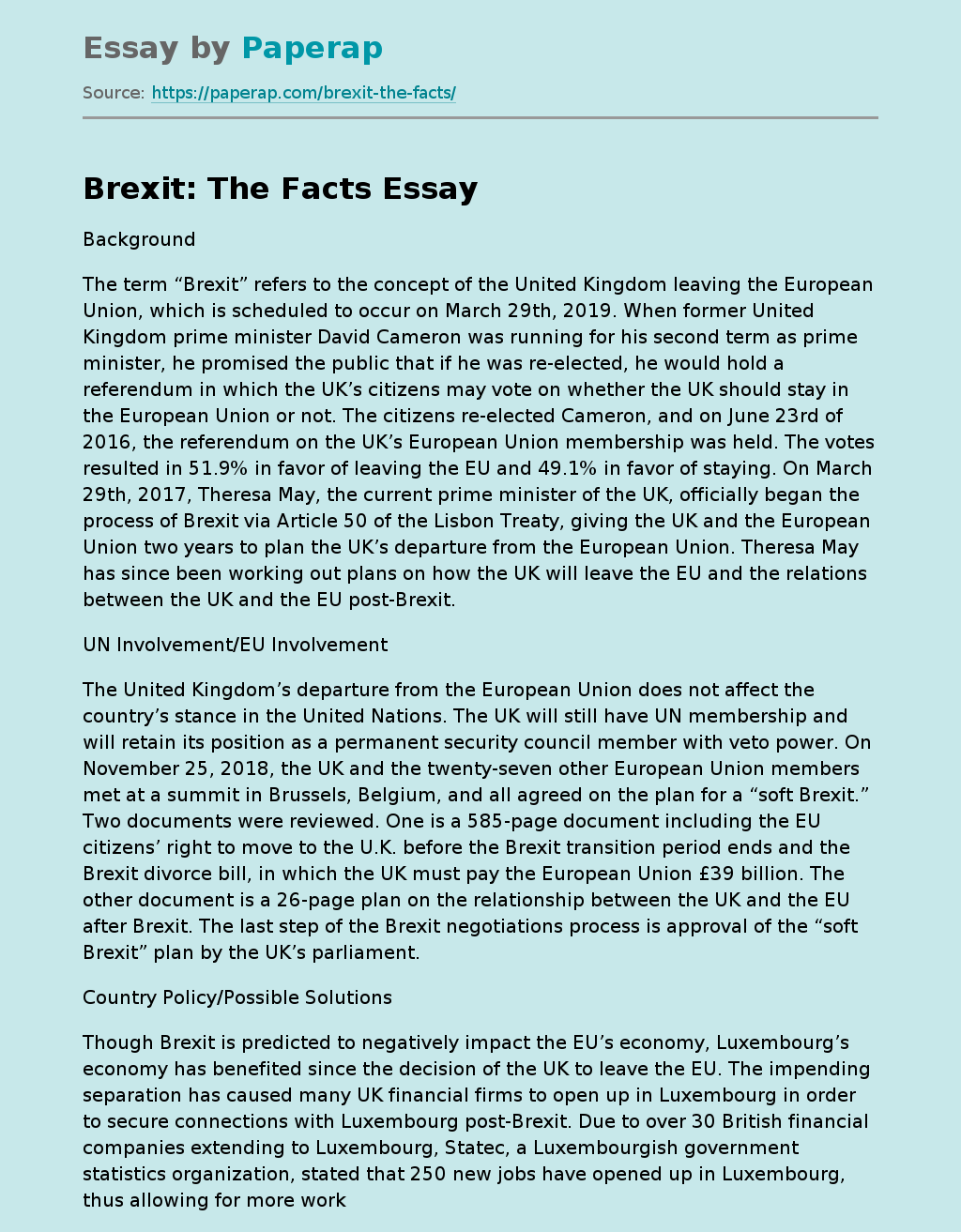Brexit: The Facts
Background
The term “Brexit” refers to the concept of the United Kingdom leaving the European Union, which is scheduled to occur on March 29th, 2019. When former United Kingdom prime minister David Cameron was running for his second term as prime minister, he promised the public that if he was re-elected, he would hold a referendum in which the UK’s citizens may vote on whether the UK should stay in the European Union or not. The citizens re-elected Cameron, and on June 23rd of 2016, the referendum on the UK’s European Union membership was held.
The votes resulted in 51.9% in favor of leaving the EU and 49.1% in favor of staying. On March 29th, 2017, Theresa May, the current prime minister of the UK, officially began the process of Brexit via Article 50 of the Lisbon Treaty, giving the UK and the European Union two years to plan the UK’s departure from the European Union. Theresa May has since been working out plans on how the UK will leave the EU and the relations between the UK and the EU post-Brexit.
UN Involvement/EU Involvement
The United Kingdom’s departure from the European Union does not affect the country’s stance in the United Nations. The UK will still have UN membership and will retain its position as a permanent security council member with veto power. On November 25, 2018, the UK and the twenty-seven other European Union members met at a summit in Brussels, Belgium, and all agreed on the plan for a “soft Brexit.
” Two documents were reviewed. One is a 585-page document including the EU citizens’ right to move to the U.K. before the Brexit transition period ends and the Brexit divorce bill, in which the UK must pay the European Union £39 billion. The other document is a 26-page plan on the relationship between the UK and the EU after Brexit. The last step of the Brexit negotiations process is approval of the “soft Brexit” plan by the UK’s parliament.
Country Policy/Possible Solutions
Though Brexit is predicted to negatively impact the EU’s economy, Luxembourg’s economy has benefited since the decision of the UK to leave the EU. The impending separation has caused many UK financial firms to open up in Luxembourg in order to secure connections with Luxembourg post-Brexit. Due to over 30 British financial companies extending to Luxembourg, Statec, a Luxembourgish government statistics organization, stated that 250 new jobs have opened up in Luxembourg, thus allowing for more workers to be employed and contribute to Luxembourg’s economy. Furthermore, many EU citizens in the UK have moved to Luxembourg while the UK is still considered part of the EU, and Luxembourg has opened up international English-speaking schools to accommodate the children who have entered the country.
Luxembourg supports the UK’s departure from the EU and does not wish to delay or cancel the process. Luxembourg, along with the UK and the other EU nations, supports a soft Brexit plan in which relationships between the UK and the EU still exist after Brexit. The soft Brexit plan includes EU citizens being able to move to the UK before Brexit occurs, and Luxembourg would like to propose that UK citizens be able to move to any of the EU countries before time runs out. Luxembourg has been positively impacted by allowing UK citizens to move into the country and become employed and believes that other nations will experience economic benefits from welcoming British EU citizens into their borders to live and work. Therefore, Luxembourg would also like to urge other EU nations to allow UK citizens to gain citizenship of the country they move to if they decide to leave the UK. In order to control the flow of people moving from the EU and the UK and vice-versa, Luxembourg would like to implement a policy in which people wishing to move to the UK or the EU can send in a citizenship application, and applications will be sent to the government of the country for approval. Approval and granting of citizenship will be based on the ability to become employed and work, as well as space available in the country. Those who have their application approved will be granted citizenship immediately and can begin settling into the country. Those who have their applications rejected will have to stay where they originally reside, and after the EU freedom of movement policy no longer applies to the UK, people wishing to move between the UK and the EU must follow the standard procedures of gaining citizenship depending on the nation they apply to.
Work Cited
- Amadeo, Kimberly. “How Brexit Affects You.” The Balance Small Business, The Balance, 26 Nov. 2018, www.thebalance.com/brexit-consequences-4062999.
- Bodoni, Stephanie. “No Deal, No Problem as Luxembourg Welcomes Brexit Bankers’ Kids.” Bloomberg.com, Bloomberg, 15 Sept. 2018, www.bloomberg.com/news/articles/2018-09-16/no-deal-no-problem-as-luxembourg-welcomes-brexit-bankers-kids.
- Boffey, Daniel, and Jennifer Rankin. “Brexit Deal Explained: Backstops, Trade and Citizens’ Rights.” The Guardian, Guardian News and Media, 25 Nov. 2018, www.theguardian.com/politics/2018/nov/25/may-brexit-deal-explained-eu-withdrawal-agreement-trade-backstop-citizens-rights.
- “Brexit: Leaked Political Declaration in Full.” The Guardian, Guardian News and Media, 22 Nov. 2018, www.theguardian.com/politics/2018/nov/22/brexit-leaked-political-declaration-in-full.
- “EU Leaders Agree UK’s Brexit Deal at Brussels Summit.” BBC News, BBC, 25 Nov. 2018, www.bbc.com/news/uk-46334649.
- “European Leaders Seal Brexit Divorce Deal, but Hard Work Lies Ahead.” NBCNews.com, NBCUniversal News Group, 25 Nov. 2018, www.nbcnews.com/news/world/european-union-leaders-seal-brexit-divorce-deal-hard-work-lies-n939781.
- Goldberg, Mark Leon. “Big Implications at the UN for Brexit.” UN Dispatch, 24 June 2016, www.undispatch.com/implications-un-brexit/.
- Hunt, Alex, and Brian Wheeler. “Brexit: All You Need to Know about the UK Leaving the EU.” BBC News, BBC, 26 Nov. 2018, www.bbc.com/news/uk-politics-32810887.
- Iyengar, Rishi. “Brexit: These 3 Facts Explain Why the U.K. Held a Referendum.” Time, Time 24 June 2016, time.com/4381184/uk-brexit-european-union-referendum-cameron/.
- “TF50 (2018) 55 – Commission to EU27.” TF50 (2018) 55 – Commission to EU27, European Commission, 14 Nov. 2018, ec.europa.eu/commission/sites/betapolitical/files/draft_withdrawal_agreement_0.pdf.
Brexit: The Facts. (2021, Dec 06). Retrieved from https://paperap.com/brexit-the-facts/

